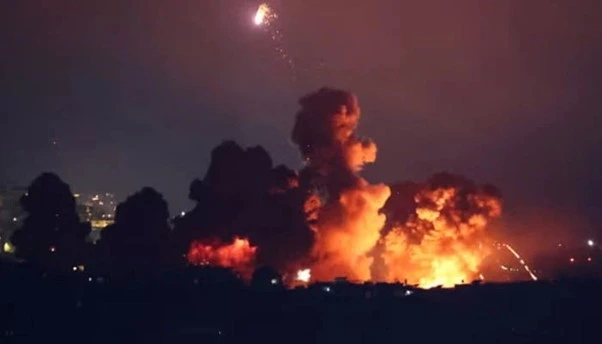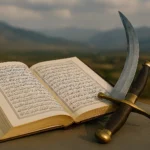On the day of Eid al-Adha, a major religious celebration for Muslims worldwide, Israeli airstrikes hit southern Beirut, therefore upsetting the delicate truce in Lebanon once more. Israel and Hezbollah have a ceasefire agreement in place for more than six months, although these additional strikes have caused fresh indignation and prompted questions on a more general escalation in the area. Declaring that the most recent military invasion violates Lebanese sovereignty and international law, the Lebanese government has demanded immediate worldwide involvement.
British media sources claim that Israeli airplanes struck facilities allegedly used in the development of drones by Hezbollah during aerial bombardments in Beirut’s southern areas on the morning of Eid. Claiming that these targets immediately endanger Israeli security, the Israeli Defence Forces (IDF) justified their action as a “pre-emptive measure.” But many of the Lebanese government officials, religious leaders, and common people, many of whom were commemorating one of the most significant holidays in the Islamic calendar, have strongly denounced the timing and location of the strikes.
In his reply, Lebanese Prime Minister Nawaf Salam was unreserved in identifying the attacks as a direct danger to Lebanon’s territorial integrity, national economy, and social stability.
“The airstrike on Beirut during a time of peaceful celebration are a grave violation of our sovereignty and an affront to the spirit of Eid,” Prime Minister Salam said in a public address.
These are not random events; rather, they are a methodical effort meant to destabilize Lebanon. Furthermore, underlined by him was how such hostility compromises Lebanon’s already precarious economy, especially in a season when family get-togethers and travel provide a fleeting escape from years of political and financial strife.
Echoing these ideas, President Joseph Aoun denounced the Israeli strikes as a clear violation of UN-mediated international agreements including the truce. “It is intolerable that such acts are carried out, particularly on Eid, a day for meditation, unity, and peace. These crimes transgress not just our boundaries but also the guidelines of international humanitarian law, he stated. President Aoun encouraged the world, especially the Security Council of the United Nations, to hold Israel responsible and act fast to stop more escalation.
Still scarred by past wars, the capital of Lebanon today suffers fresh anxiety and uncertainty. Though no official claims of injuries have been verified, southern Beirut residents claimed damage to both residential and commercial structures following the bombings. Still, the psychological toll of the attack, especially on a day designed for celebration, is impossible to overestimate. Scene footage showed individuals running in terror, and many families decided to postpone customary events out of concern about more strikes.
Israel’s military insists that its activities are precisely targeted and meant to destroy military equipment connected to Hezbollah. IDF spokesman said the strikes were “necessary to neutralize facilities used for the production and storage of drones that pose a danger to Israeli security.” Lebanese officials counter that the actual victims are citizens caught in the crossfire and that these assertions are sometimes exploited as cover for more general strategic objectives.
The war gains a profoundly symbolic aspect from the date of the strikes, on Eid al-Adha. Celebrated as the “Festival of Sacrifice,” Eid al-Adha honours Prophet Ibrahim’s readiness to offer his son in service to God. Muslim families get together currently for deeds of kindness, feasts, and prayers. Attacking during such a holy time has been mostly understood in Lebanon as not just a military provocation but also a great cultural disrespect.
Since then, the Lebanese government has formally complained to the United Nations and other international agencies about violations of the ceasefire agreement signed following earlier conflicts between Israel and Hezbollah. Although UNIFIL, the United Nations Interim Force in Lebanon, has urged moderation on all sides, it has not responded specifically in reaction to the latest escalation. Critics contend that the UN’s meagre reaction merely fuels more aggression and compromises attempts at peacekeeping
Nowadays, many Lebanese people are doubting the success of the truce and the eagerness of foreign players to enforce peace in the area. The revived violence also coincides with Lebanon’s continued efforts for rehabilitation after the catastrophic Beirut port explosion in 2020, political stalemate, and significant economic difficulties. Apart from posing a threat to starting a more general armed war, the airstrikes compromise the nation’s laborious and agonizing path of healing.
Particularly if Hezbollah responds, there are mounting concerns that the present escalation could develop into a broader conflict. Although the militant group has kept a rather low profile in recent months, supposedly respecting the conditions of the truce, Israeli charges about drone production imply that tensions have been boiling under the surface. Should Hezbollah reply with rocket fire or other strikes, it might set up a larger conflict involving regional powers and force Lebanon into still another protracted war.
Internationally, responses have been conflicting as well. Although several Western nations have voiced worries about the bloodshed, they have not fully denounced the Israeli strikes all around. Human rights groups, however, have been more outspoken, alerting people that the assaults might violate international law particularly considering the civilian character of the targeted regions and the importance of the Eid celebration.
The more Lebanon works through the shock of yet another attack on its land, the more general the issue of how to preserve peace in a place where cease-fires are so readily broken, and responsibility is so frequently avoided remains. For many in Lebanon, the strike on Eid serves as a sobering reminder of their fragility in a geopolitical struggle that still defines their life rather than only a military action.
The cycle of violence will probably continue unless significant diplomatic efforts are revived and both sides are held to the terms of their agreements, therefore destroying all chances for long-lasting peace. The world community must understand the urgency of the moment for the stability of Lebanon as well as for the whole area. For now, Beirut’s residents and those beyond are left to pick up the fragments, once more, among the wreckage of another failed ceasefire.







